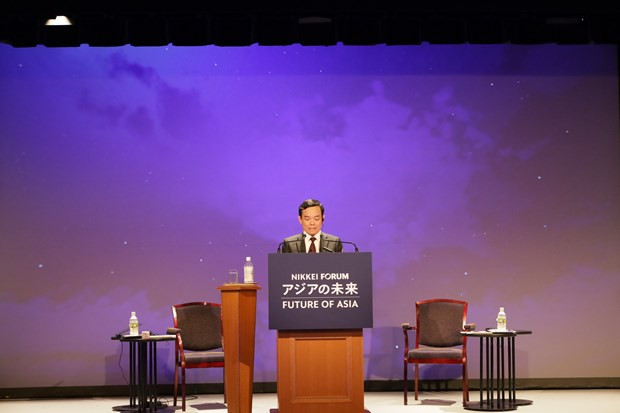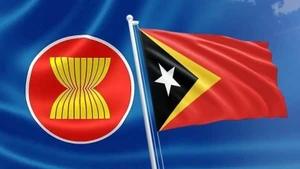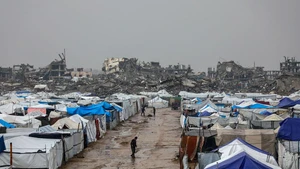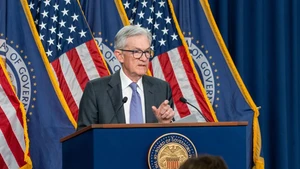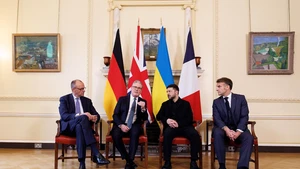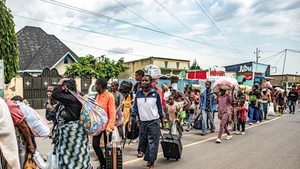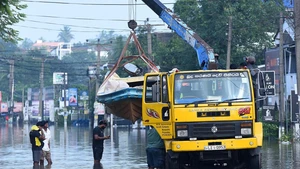Highly valuing the conference’s theme of “Leveraging Asia’s power to confront global challenges”, Quang said the world and Asia are witnessing turning-point changes with many intertwined opportunities and challenges. In that context, Asia should be responsible for and play an important role in tapping into opportunities and addressing difficulties and challenges of the era.
Asia holds all the necessary potential and advantages for leveraging its contributions to the settlement of challenges facing humankind and for becoming a role model of peace, cooperation, and development, he noted.
Giving five suggestions, the Deputy PM said that first, Asian countries need to share and realise the vision on building a rules-based and UN Charter-centred international system; consistently promoting multilateral cooperation and engaging in reforming and improving the efficiency of such global governance institutions as the World Trade Organisation (WTO), the International Monetary Fund (IMF), and the World Bank (WB); and increasing the exchange of viewpoints and coordination of stances on global governance issues.
Second, Asia should promote joint efforts and actions more strongly to cope with global challenges, reach the Sustainable Development Goals, and tackle new and non-traditional global challenges like energy security, cybersecurity, human security, and health security; support the global approach to the settlement of development challenges; encourage enterprises’ intensive and extensive participation in development programmes and projects; and create favourable institutional conditions to step up the public - private partnership.
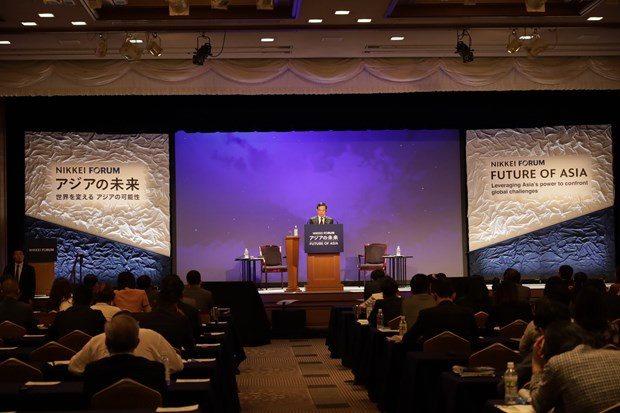 |
| Deputy PM Tran Luu Quang speaks at the 28th International Conference on the Future of Asia on May 25. (Photo: VNA) |
Third, countries should cooperate more closely and effectively to jointly achieve fast, inclusive, and sustainable development; and properly bring into play new growth impetuses such as digital transformation, green transition, and innovation.
More developed countries in the continent should help developing ones improve institutional, infrastructure and manpower capacity, share technology and governance models; develop economies centred on humans and based on fine cultural values; and consider the hanlding of difficulties and challenges as a cooperation driver for stronger development, Quang recommended.
Fourth, it is necessary to further boost people-to-people exchanges, youth connectivity, and partnerships in culture, education, and tourism.
Fifth, he emphasised that ensuring the creation and consolidation of a peaceful and stable environment is the prerequisite for development in Asia and the world. It is necessary to identify that solidarity, cooperation, responsibility, building strategic trust, respect for the UN Charter and international law, as well as peaceful settlement of disputes will connect countries so that they can together surmount difficulties, challenges, and crises.
Regarding the East Sea/South China Sea issue, the official went on, the parties concerned need to seriously implement the Declaration on the Conduct of Parties in the East Sea (DOC) and build a substantive and effective code of conduct (COC) that accords with international law, especially the 1982 UN Convention on the Law of the Sea (UNCLOS), while exercising self-restraint and refraining from actions that may complicate the situation or violate the related countries’ sovereignty, sovereign right, and jurisdiction established under the 1982 UNCLOS.
In his speech, Deputy PM Quang spoke highly of Japan’s role in efforts to leverage Asia’s power, stressing that the country has taken the lead in promoting initiatives and been a key link in regional and global economic connectivity structures and value chains. It has also pioneered in fostering digital transformation and green transition, recovering and guaranteeing supply chain security, strengthening trade and investment cooperation, and responding to development challenges.
Vietnam attaches importance to the enhancement of ties with partners, including its extensive strategic partnership with Japan, he affirmed, expressing his belief that the two countries will become a model of the partnership for development.
At the conference, Quang also highlighted Vietnam’s development targets, orientations, viewpoint, and priorities. He underlined the country’s consistent foreign policy of independence, self-reliance, multilateralisation and diversification of external relations, and being a good friend, trustworthy partner, and active and responsible member of the international community.
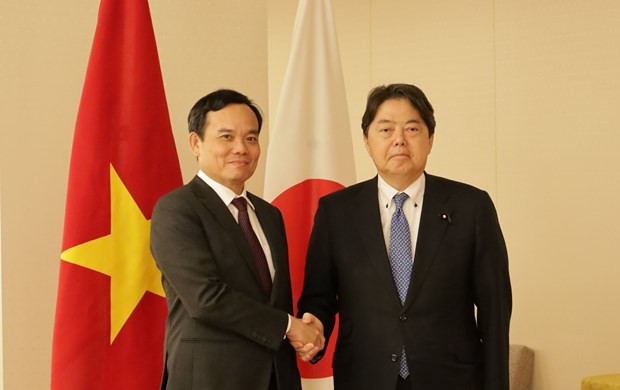 |
| Deputy PM Tran Luu Quang (L) meets with Japanese Foreign Minister Hayashi Yoshimasa in Tokyo on May 25. (Photo: VNA) |
Also on May 25, Deputy PM Quang had meetings with Japanese Foreign Minister Hayashi Yoshimasa and Chief Representative of the Komei Party of Japan Yamaguchi Natsuo.
During the meetings, the Deputy PM asked the Japanese side to provide new-generation ODA for Vietnam and facilitate Vietnam's participation in Japan's support programme to build quality infrastructure in Indo-Pacific and the Asia Energy Transition Initiative (AETI). He also hoped for Japan's support for the Vietnamese community in Japan.
Quang agreed with Yamaguchi's suggestion on promoting exchanges through the party and parliament channels, particularly between young and female parliamentarians.
